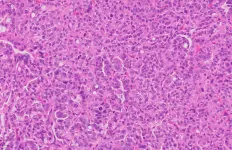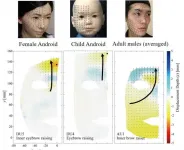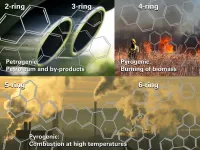(Press-News.org) People are not very nice to machines. The disdain goes beyond the slot machine that emptied your wallet, a dispenser that failed to deliver a Coke or a navigation system that took you on an unwanted detour.
Yet USC researchers report that people affected by COVID-19 are showing more goodwill -- to humans and to human-like autonomous machines.
"The new discovery here is that when people are distracted by something distressing, they treat machines socially like they would treat other people. We found greater faith in technology due to the pandemic and a closing of the gap between humans and machines," said Jonathan Gratch, senior author of the study and director for virtual humans research at the USC Institute for Creative Technologies.
The findings, which appeared recently in the journal iScience, come from researchers at USC, George Mason University and the U.S. Department of Defense.
The scientists noted that, in general, people mostly dispense with social norms of human interaction and treat machines differently. The behavior holds even as machines become more humanlike; think Alexa, the persona in your vehicle navigation system or other virtual assistants. This is because human default behavior is often driven by heuristic thinking -- the snap judgments people use to navigate complex daily interactions.
In studying human-machine interactions, the researchers noted that people impacted by COVID-19 also displayed more altruism both toward other people and to machines.
They showed this using the simple "dictator game," which has been used in other studies as an established method to measure altruism. The scientists selected people who had been adversely affected by COVID-19, based on measurements of stress, and then enrolled them in the roleplaying game - with a twist. In addition to engaging other people in the exercise, the subjects also engaged computers.
Unexpectedly, the people affected by COVID-19 showed the same altruism toward computers and human partners. As the participants were increasingly distracted with coronavirus concerns, they became more compassionate toward machines.
"Our findings show that as people interacted more via machines during the past year, perceptions about the value of technology increased, which led to more favorable responses to machines," Gratch said.
Also, scientific breakthroughs that produced coronavirus vaccines in record time may have renewed faith in technology. The COVID-19 vaccines were developed in less than a year by leading universities and pharma companies worldwide. Such breakthroughs can affect how people respond to technology in general, Gratch explained.
The study findings are consistent with previous research that shows disasters often bring out compassion in people who feel compelled to help. During the COVID-19 pandemic, people grew more dependent on machines to purchase products online, work remotely from home, take classes or gain manufactured personal protective equipment. The results indicate that it is possible to encourage goodwill toward machines in other ways, perhaps including machines that express emotions or cultural cues.
But the study also raises concerns. For example, nefarious programmers could design machines to look and sound more human to gain people's trust and then defraud them.
INFORMATION:
In addition to Gratch, the study authors are Celso M. de Melo of the U.S. Army Research Laboratory and Frank Krueger of George Mason University in Virginia.
Support for the research comes from the U.S. Army, as well as the Minerva Research 387 Initiative in partnership with the Air Force Office of Scientific Research (grant nos. 388 FA9550-18-1-0182 and FA9550-18-0455).
Cancer immunotherapy may get a boost from an unexpected direction: bacteria residing within tumor cells. In a new study published in Nature, researchers at the Weizmann Institute of Science and their collaborators have discovered that the immune system "sees" these bacteria and shown they can be harnessed to provoke an immune reaction against the tumor. The study may also help clarify the connection between immunotherapy and the gut microbiome, explaining the findings of previous research that the microbiome affects the success of immunotherapy.
Immunotherapy treatments of the past decade or so have dramatically improved recovery rates from certain ...
National work-family policies that give lower-income families more time together while allowing them paid time off are more effective for children's psychological health than cash transfers, according to a study of developed nations led by Baylor University.
In a study of about 200,000 children in 20 developed nations, the United States ranked lowest in overall policies aimed at helping parents support children.
The study, published in the journal Social Forces, supports the view of critics who say that the United States government does not do enough to mandate ...
Repeatedly getting angry, hitting, shaking or yelling at children is linked with smaller brain structures in adolescence, according to a new study published in Development and Psychology. It was conducted by Sabrina Suffren, PhD, at Université de Montréal and the CHU Sainte?Justine Research Centre in partnership with researchers from Stanford University.
The harsh parenting practices covered by the study are common and even considered socially acceptable by most people in Canada and around the world.
"The implications go beyond changes in the brain. I think what's ...
Cancers are not only made of tumor cells. In fact, as they grow, they develop an entire cellular ecosystem within and around them. This "tumor microenvironment" is made up of multiple cell types, including cells of the immune system, like T lymphocytes and neutrophils.
The tumor microenvironment has predictably drawn a lot of interest from cancer researchers, who are constantly searching for potential therapeutic targets. When it comes to the immune cells, most research focuses on T lymphocytes, which have become primary targets of cancer immunotherapy ...
Wikipedia page views could be used to monitor global awareness of biodiversity, proposes a research team from UCL, ZSL, and the RSPB.
Using their new metric, the research team found that awareness of biodiversity is marginally increasing, but the rate of change varies greatly between different groups of animals, as they report in a paper included in an upcoming special section of Conversation Biology.
Lead author, PhD student Joe Millard (UCL Centre for Biodiversity & Environment Research, UCL Biosciences and Institute of Zoology, ZSL) said: "As extinctions and biodiversity losses ramp up worldwide, largely due to climate change and other human actions, it's vital that ...
A study by the Dian Fossey Gorilla Fund shows that gorilla families come together to support young gorillas that lose their mothers.
The findings, published in the journal eLife, use the Fossey Fund's more than 50-year dataset to discover how maternal loss influences young gorillas' social relationships, survival and future reproduction. The study shows when young mountain gorillas lose their mothers, the rest of the group helps buffer the loss by strengthening their relationships with the orphans.
"Mothers are incredibly important for survival early in life--this is something that is shared across all mammals," said lead author Dr. Robin Morrison. "But in social mammals, like ourselves, mothers often continue to provide vital support up to adulthood and even beyond."
"In ...
Osaka, Japan - Researchers from the Graduate School of Engineering and Symbiotic Intelligent Systems Research Center at Osaka University used motion capture cameras to compare the expressions of android and human faces. They found that the mechanical facial movements of the robots, especially in the upper regions, did not fully reproduce the curved flow lines seen in the faces of actual people. This research may lead to more lifelike and expressive artificial faces.
The field of robotics has advanced a great deal over the past decades. However, while current androids can appear very humanlike at first, their active facial expressions may still be unnatural and slightly unsettling to us. The exact reasons ...
Although cancers that occur in the gallbladder or bile ducts are rare, their rates are increasing. A recent study provides details on the burden of gallbladder and biliary tract cancer (GBTC) across 195 countries and territories from 1990 to 2017. The findings are published early online in CANCER, a peer-reviewed journal of the American Cancer Society.
Determining GBTC estimates and trends in different global regions can help to guide research priorities and policies for prevention and treatment. With this in mind, a team of scientists examined publicly available information ...
Patient care by a single primary care physician is associated with many health benefits, including increased treatment adherence and decreased hospital admissions and mortality risk. But can the relationship built between doctor and patient also lead to unnecessary care?
A new University of Florida study finds that male patients who have a single general physician were more likely to receive a prostate cancer screening test during a period when the test was not recommended by the US Preventive Services Task Force. The study, which appears in END ...
When power stations burn coal, a class of compounds called Polycyclic Aromatic Hydrocarbons, or PAHs, form part of the resulting air pollution. Researchers have found that PAHs toxins degrade in sunlight into 'children' compounds and by-products.
Some 'children' compounds can be more toxic than the 'parent' PAHs. Rivers and dams affected by PAHs are likely contaminated by a much larger number of toxins than are emitted by major polluters, researchers show in Chemosphere.
A coal-fired power station and a cigarette have more in common than one might think. So do the exhaust pipes from cars and burning crop residues. The same is true for an aeroplane passing high over a wildfire ...



